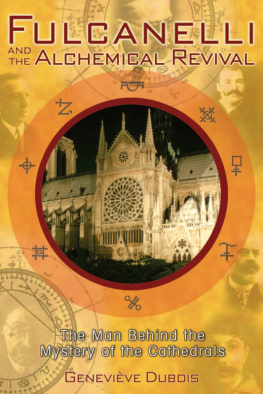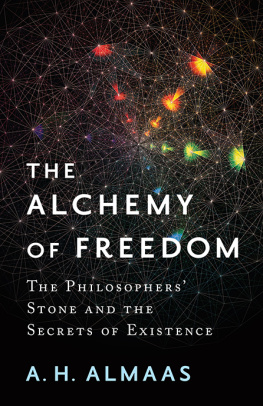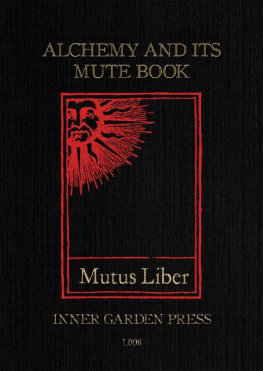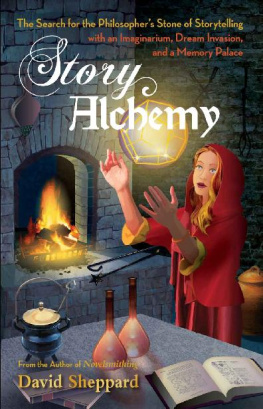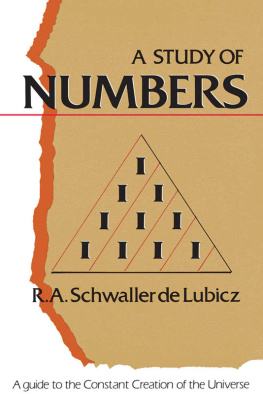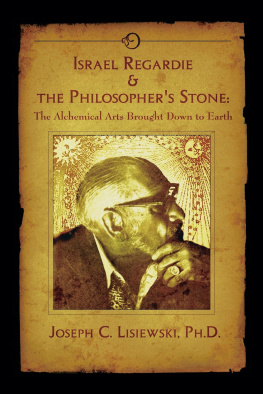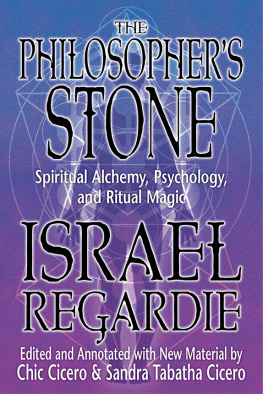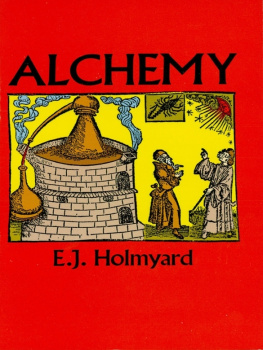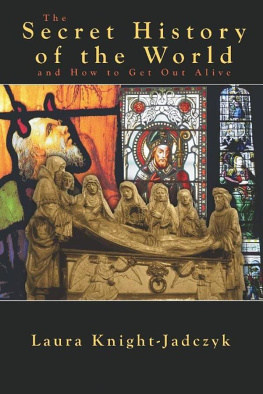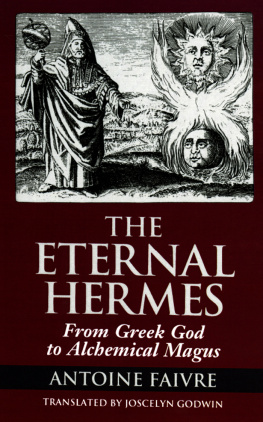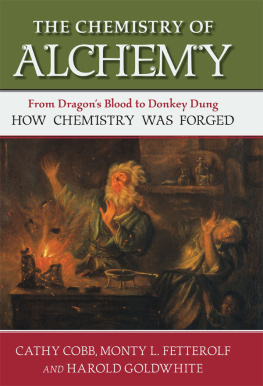FULCANELLI
AND THE
ALCHEMICAL REVIVAL
The Man behind the Mystery of the Cathedrals
Genevive Dubois

Translated by Jack Cain

Destiny Books
Rochester, Vermont
With thanks to
C. J. Faust,
Mrs. Duhamel,
the family of Pierre Dujols,
Mr. and Mrs. Daniel Finot,
and also, of course, the Saturday morning philosophers
FOREWORD
If there is one enigma of our time that does not cease to pique the curiosity of seekers, and, moreover, which appears to be unsolvable, as is the case with famous historical mysteries such as Louis XVII and the Man in the Iron Mask, it is without a doubt the one occupying first place in the realm of hermetic sciencethat is, the haunting Fulcanelli affair.
Indeed, ever since the publication of the two famous works bearing this eloquent pseudonym, namely, Le Mystre des Cathdrales (1926) each subsequently republished twice, the attention of a certain segment of the publicthe one generally limited in size but nevertheless attuned to the disciplines that have come to be known under the rubric of esotericism, understood to be a vast field in its own rightlost no time in becoming firmly fixated on the task of identifying the real author of these books, without, however, managing to puncture the facade of anonymity that has seemed impervious to all attack.
The attempts at solving the mystery of Fulcanellis identity have been many. Even foreign countries, notably Spain, have been involved, without, in the end, any solution being found. Various specialized journals have published serious articles bearing on this irksome question, but the mystery has remained intact, to the great disappointment of all those who have hoped for a solution.
Before proceeding further on the topic of Fulcanelli, however, I believe that it is of paramount importance to dispel in advance any ambiguity as to the true nature of alchemy, a subject so maligned and adapted to any purpose that anyone at all, no matter his qualifications, has felt free to offer an explanation of the meaning of this high science. Thus we hear talk of such things as spiritual alchemy and Tantric alchemy when we are not seeing alchemy saddled with psychoanalytical meanings by a certain school that is attached to psychic archetypes, notably those arising from the study of dreams and taking as their subject matter the study of man! All these erroneous conceptions seem to arise for some individuals entirely from the results of a total misunderstanding of the Sacred Art, whereas for others, these misunderstandings seem to come from a deliberate willfulness to lead minds astray.
It should also be noted that in many works with alchemical aspirations, the authors, lacking adequate information, commit the common and unacceptable mistake of claiming a supposed Black Work that foreshadows, as they would say, two following stages designated, respectively, the White Work and the Red Work.
The truth of the matter is that these two final stages, which lead to real but different results, constitute within themselves alone the core of the hermetic work, the black representing only what the alchemists mean by putrefaction.
In reality, it is quite clear that even though it absolutely cannot be thought of apart from its fiery oven, authentic alchemy is something entirely other. And in order to defer to three authors who are duly qualified and whose authority in this matter is unanimously recognized in hermetic circles, I cannot resist the salutary obligation of transcribing their respective advice, starting with my old friend of forty years, Eugne Canseliet, the famous writer of prefaces for the two Fulcanelli works already mentioned, and who, in a manner not unpleasing to our omniscient scientists, declares forthrightly in his precious Alchimie explique sur les textes classiques: How misguided it is that popular legend would have us believe that alchemy consists entirely in the artificial production of metallic gold when its principal goal is the discovery
Let us continue with these words from my very dear but recently departed friend Claude Lablatinire dYg, who, in his Nouvelle Assemble des Philosophes Chymiques, makes clear for us: May those who think that alchemy is strictly of a character that is earthly, mineral, and metallic give it a wide berth. May those who think that alchemy is only a symbolism used to reveal through analogy the process of spiritual revelationin short, that man is the material and the athanor is his workabandon it.
Here is a clearly stated extract from the fifth pistola Hermetica, published in the highly regarded journal Atlantis, founded by Paul Le Cour:
Yes, there exists in fact only one alchemy that is not so much ours as that of Nicolas Flamel and that of Basile Valentin, the Cosmopolite, Cyliani, or Fulcanelli.... How terribly crude it is seen to bethis idea often encountered that holds that alchemy is solely the wild pursuit of the ancient Chrysopoeia,
Could anything be more explicit than these three incontrovertible declarations? Such statements are quite necessary in order to place those Lovers of Science, who are sincere but are just beginning on their guard against widely distributed and terrible books that can do nothing but lead us down the garden path. What is also indicated by this is how we must strictly follow only those texts recognized as classic texts!
Now let us return to the purpose of this preface: describing the recent situation concerning the mysterious pseudonym Fulcanelli.
And it was just then, with benevolent concern, that Providence, judging no doubt that the moment had come to have the truth burst forth, descended upon a young woman who had always been haunted by this mystery and who was a member of our little spiritualist group in Grenoble. Fascinated by this famous enigma, Genevive Dubois, for it is indeed she we are speaking of, firmly rose to the challenge by adopting the unshakable resolution to try and tear away the veil.
Embodying a limitless energy together with a tenacity and discernment worthy of Sherlock Holmes, she did not hesitate to mobilize all resources to reach her goal, exemplifying thereby the famous saying: What woman wants, God wants.
Not stinting on the inevitable expenses that such an inquiry involves, our friend took many trips and established numerous and fruitful contacts, both in the provinces, in areas sometimes very distant from one another, and particularly in Paris, where sharp minds, won over by her endeavor, were quick to offer her their bibliographic skills and their support. Without letting herself become disconcerted by the scope and extreme difficulty of the task, our intuitive investigator managed fortuitously to meet certain involved families who, convinced of the sincerity of her undertaking, freely made available their textual and visual archives, going so far as to authorize the making of copies and photographic reproductions, a large number of which appear in this publication.
In conclusion, I consider it a duty to pay well-deserved homage to Genevive Dubois, for her book, embellished with a lively style that is inlaid at times with felicitous turns of phrase, provides a very developed and ever-so-revealing synthesis that forms the crowning glory of all the efforts undertaken to arrive, finally and happily, at the conclusion of such a thankless, complex, and incredible inquiry.
Refusing to give away anything, even in part, concerning her work, and wanting not to overly tax the patience of the reader, I am anxious to let the author lead on from one surprise to the next.
Next page
